Best Telescopes for Astrophotography No Matter Your Skill or Budget
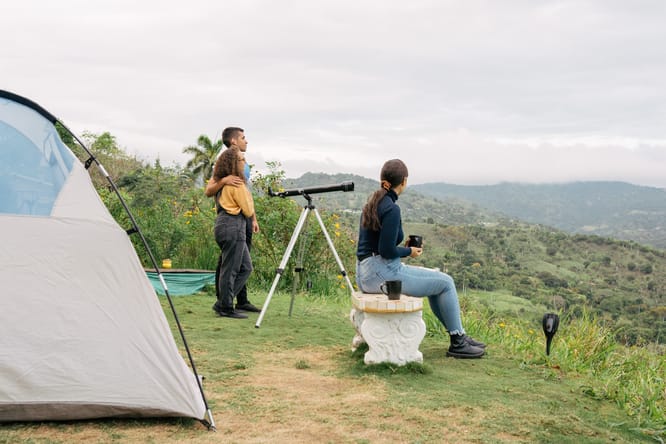
Finding the perfect telescope for astrophotography can be difficult — too many choices, exorbitant prices, conflicting reviews — and often you may give up searching before you’ve really even begun. Luckily for you, we’ve picked out the top ten best telescopes for astrophotography that shouldn’t break the bank, and will still give you crystal-clear images of the night sky and all its wonders.
RELATED: 15 Best Telescopes To See Planets in 2023
Best Telescope for Beginners
Sharpstar 61mm Triplet Refractor, $549
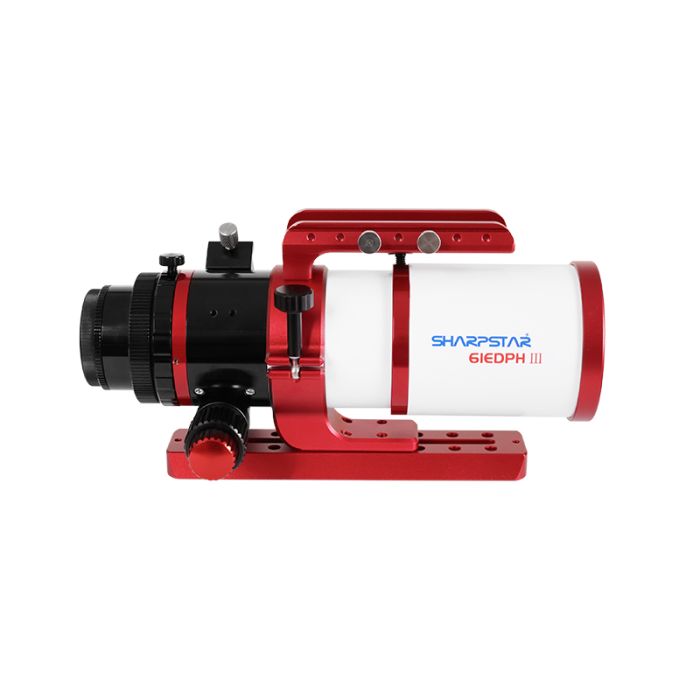
The third version of the Sharpstar 61EDPH will leave you stunned at the amazing images it is able to capture, by providing two elements of low-dispersion ED glass in the triplet, apochromatic design. This will provide a higher quality image — exactly what you need for astrophotography.
The focal ratio supports a 44mm full-frame image circle, also creating a high-quality portable refractor, which combined with an optional dedicated reducer or flattener can make the images even better. The frame is made of aluminum and anodized white and red paint for lasting integrity, and the multifunction handle will allow you to use this telescope in any way you need, and is the perfect beginner telescope on our best telescopes for astrophotography list.
Telescope Specifications
- Aperture: 2.5″ (61mm)
- Focal Length: 335mm
- Focal Ratio: f/5.5
- Tube Weight: 5lb
- Tube Length: 235mm
Best Telescopes for People on a Budget
3. Skywatcher Explorer 200P Newtonian Telescope, $431
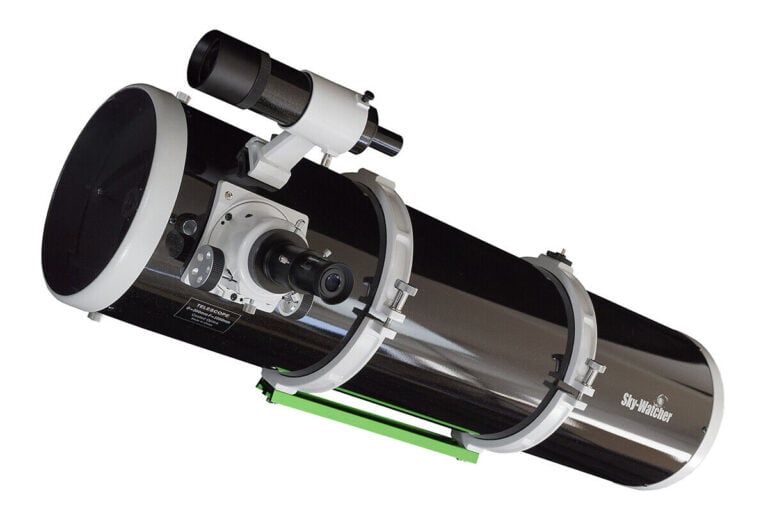
Our first selection for the best telescopes for people on a budget is the Skywatcher Explorer 200P Newtonian telescope, which happens to be a very affordable Newtonian telescope to start your astrophotography journey. The large aperture and focal length allow the viewer to zoom in on smaller deep-sky objects, but you may want to invest in an additional coma corrector to get round stars across your entire field of view.
This specific telescope can be perfect for intermediate-to-advanced astronomers, or even the serious adult beginner. Since the aperture is larger, you get to view even the faintest of objects in the sky, seeing more and learning more about the night sky we live under. You can view objects such as the Moon, planets, nebulae, galaxies, star clusters, double stars, and more with the Skywatcher Explorer 200P.
Telescope Specifications
- Aperture: 200mm
- Focal Length: 1000mm
- Focal Ratio: f/5
- Tube Weight: 19.4lbs
- Tube Length: 920mm
2. William Optics Zenith Star 61 f/5.9 Doublet APO, $599
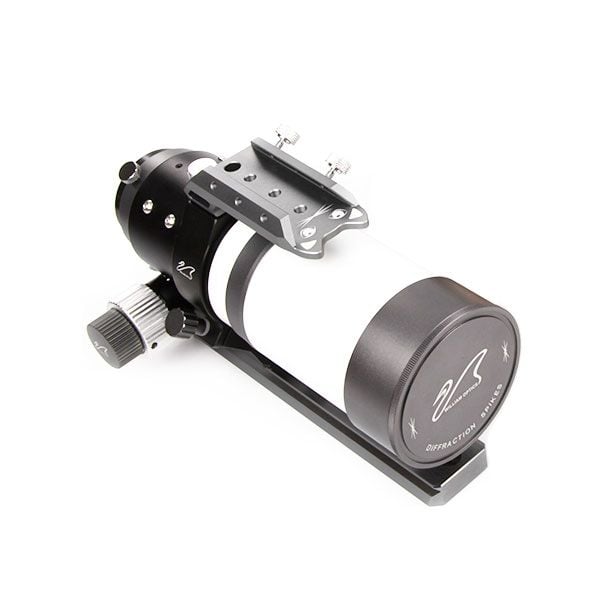
If you’re looking for a portable telescope that still provides great views of the night sky, try out the William Optics ZenithStar. The refractor within the telescope uses an FPL-53 glass to produce sharp imagery, and the Z61 refractor gives high-power performance for both wildlife and lunar photography. Within the objective lens, the ED and SD glass dispersion properties are critical to color correction, making each photo the exact same as how you saw the night sky.
Everyone who buys this telescope loves the clarity and ease of operation, and since each one is tested on William Optic’s Interferometer, you can be assured that they provide quality each time you buy. Our favorite part about this telescope is the sharp colors the scope comes in, along with its portability. There is nothing more cumbersome than lugging around a large and heavy telescope, but you don’t have to worry about that here.
Telescope Specifications
- Aperture: 2.5″ (61mm)
- Focal Length: 360mm
- Focal Ratio: f/5.9
- Tube Weight: 3.2lbs
- Tube Length: 230mm
1. Orion 8″ Astrograph, $694
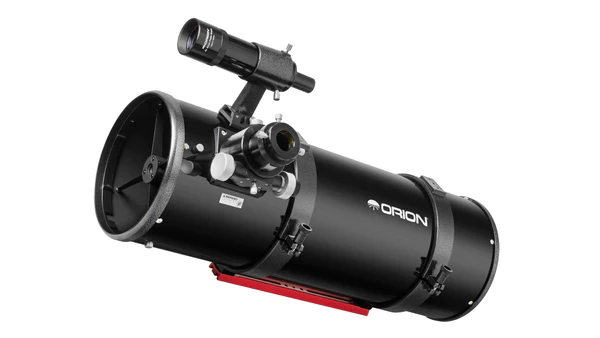
If you’re on a budget and want a telescope that will last you for years before needing to upgrade, but still won’t break the bank, the Orion 8″ Astrograph is a best-seller amongst new astrophotographers. Even if you upgrade past this telescope, you can still bet that the Orion will give you clear images of the night sky. Its portability will not make the quality suffer, and the telescope excels at capturing bright, detailed images with CCD or DSLR cameras.
Since this is a fast Newtonian reflector, you may want to get a coma corrector in order to achieve the best possible images, and a plus of the Orion is the optional eyepiece, so you can use the telescope as a fine visual instrument to study the sky as well. One final advantage of using the Orion is the cooling accelerator fan that is included on the primary mirror cell for temperature equilibration to ensure each image is stable.
Telescope Specifications
- Aperture: 8″ (203mm)
- Focal Length: 800mm
- Focal Ratio: f/3.9
- Tube Weight: 17.5lbs
- Tube Length: 762mm
CHECK OUT: 10 Best Printers for Home Use on Amazon
Best Astrophotography Telescope Under $200
ABOTEC Telescope for Adults Astronomy, $180
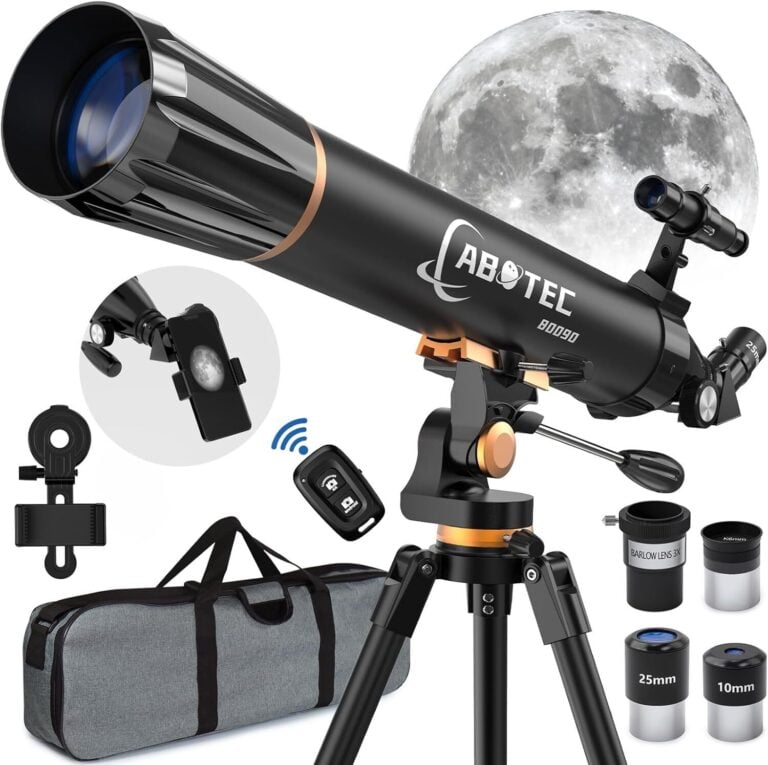
Though the ABOTEC Telescope does not have all of the bells and whistles of the other ones on our list, it’s a perfect gift for the budding astrophotographer who wants to delve into the night sky and its many wonders. The large aperture collects more light while the multi-coated high transmission objective lens can reduce light refraction, so you can get clearer and brighter images with ease.
Three different lenses can be used, and the highest magnification can even allow you to see the craters of the Moon, and planets Saturn and Jupiter. The telescope comes with a phone adapter and wireless remote, so you can snap pictures with just a click of a button, and is so easy to set up that a child of 8-12 years could do it. If you have a family of budding astronomers, this may be the perfect purchase for them.
Telescope Specifications
- Aperture: 90mm
- Focal Length: 800mm
- Tube Weight: 10.63lbs
Best Telescopes for Astrophotography Under $1000
4. William Optics Gran Turismo 71 APO Refractor, $848
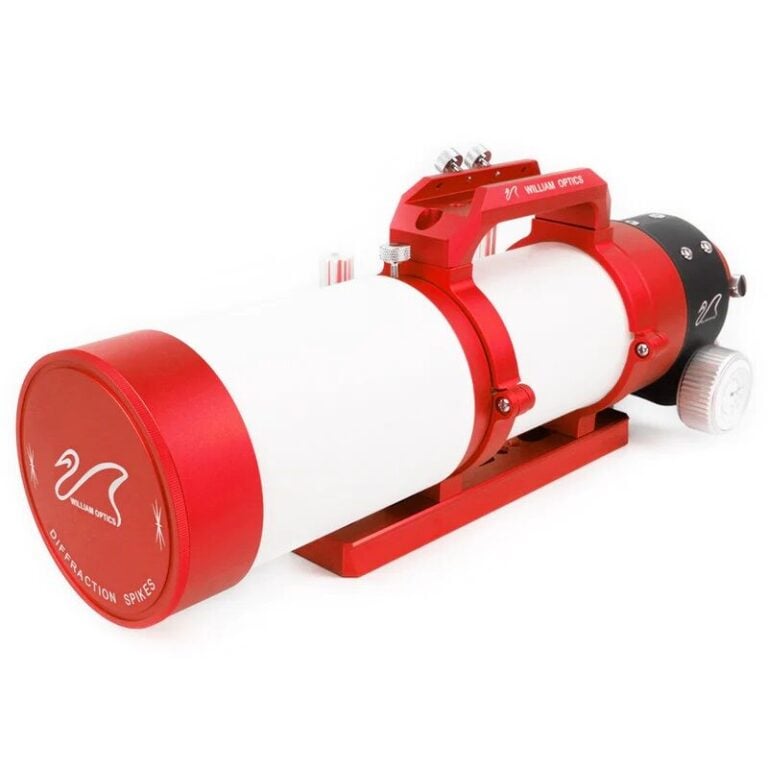
Perfect for photographers who want an easy and portable setup but still want to avoid chromatic aberration, the William Optics Gran Turismo will provide clear and detailed images of the cosmos. This is due to the three-element design and FPL-53 glass, which provides excellent pinpoint images.
Another perk of the William Optics Gran Turismo is the clear built-in Bahtinov Mask, which is unique to all William Optics optical tubes, providing a clear image and wide field of range while looking up. Since it is only 6.1 lbs, you shouldn’t need to worry about carrying this telescope out into a field, or wherever you decide to take photos of the night sky.
Telescope Specifications
- Aperture: 2.75″ (71mm)
- Focal Length: 420mm
- Focal Ratio: f/5.9
- Tube Weight: 6.1lbs
- Tube Length: 325mm
3. Explore Scientific 80mm f/6 Triplet Refractor, $899
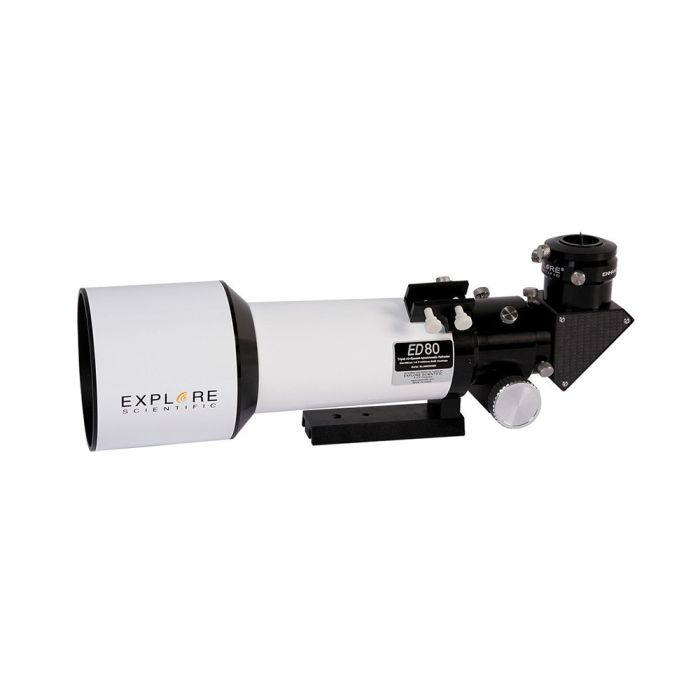
One of the heavier but still worthwhile telescopes is the Explore Scientific 80mm Triplet Refractor, which has a Hoya FCD100 optic that allows for beautifully sharp and highly contrasted images. Painted white but still made of rugged, black anodized metal with chrome-plated metal screws, you shouldn’t be worried about taking this telescope all over for the perfect night sky photo.
Going back to the Hoya FCD100 glass, it is considered the best glass ever produced by Hoya and allows the telescope to have unprecedented advanced chromatic aberration correction, and gives the Explore Scientific telescope an edge over other brands. Along with the compatible hybrid scope base and ability to have accessories attached, there is not much you can’t do with this best telescope for astrophotography.
Telescope Specifications
- Aperture: 3.25″ (80mm)
- Focal Length: 480mm
- Focal Ratio: f/6
- Tube Weight: 7.5lbs
- Tube Length: 381mm
2. Askar FRA 300 Pro, $949
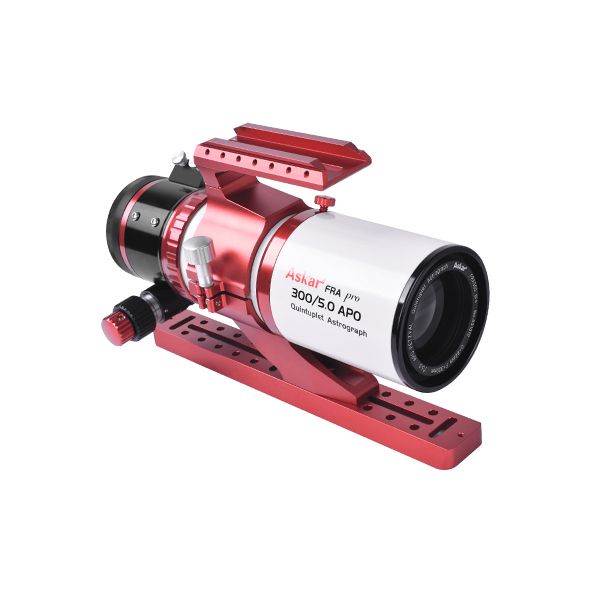
If you want a telescope that can look at large nebulae, you might want to check out the Askar FRA 300. The portable astrograph can provide quality flat frame images and crisp star shapes when you are pointed at the night sky. If you are not sure what FRA means, all it is is “Flat-Field Refractive Astrograph” which means the telescope has built-in flat field correction without needing an additional field flattener.
The other interesting thing about the Askar is that it uses a design similar to Petzval so the optical tube is excellent at controlling and diminishing chromatic aberration, so all stray light is removed and it reduces peripheral light at full-frame. Another telescope capable of going wherever you take pictures of the night sky, it makes sense with the Askar FRA 300 landed on our best telescopes for astrophotography list.
Telescope Specifications
- Aperture: 2.25″ (60mm)
- Focal Length: 300mm
- Focal Ratio: f/5
- Tube Weight: 5lbs
- Tube Length: 303mm
1. Orion ED80T Carbon Fiber ED APO Refractor Telescope, $929
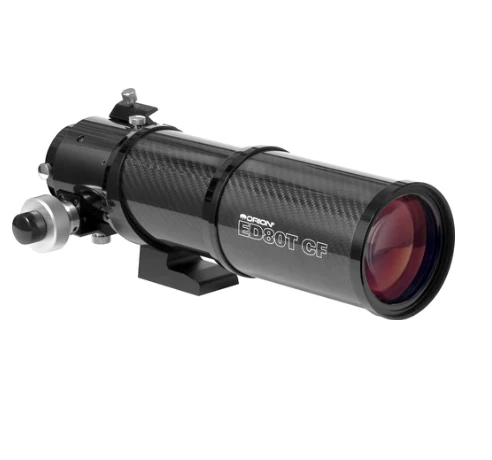
Last on our best telescopes under $1,000 is the Orion ED80T telescope, which is very popular in the amateur astrophotography market, and has been so for many years with good reason. The carbon fiber construction means the telescope is still relatively light (5.5 lbs) and is easy to carry around. The FPL-53 glass, mentioned in some other telescopes on this list, is also included in the Orion ED80T, allowing for color aberration-free images of the night sky.
The Orion ED80T is an apochromatic refractor telescope, and these types have a devoted following from amateur astronomers, so if you fit in this category, it may be worth taking a good look at this telescope. These apochromatic refractors can significantly reduce chromatic aberration (false color) compared to the standard achromatic refractor telescopes, and this is due to the use of extra-low dispersion (ED) optical glass. Whether you’re a beginner, intermediate, or pro, the Orion ED80T is a great choice.
Telescope Specifications
- Aperture: 3.25″
- Focal Length: 480mm
- Focal Ratio: f/6
- Tube Weight: 5.5lbs
- Tube Length: 381mm
READ MORE: 15 Best Gaming Recliner Chairs
Best Astrophotography Telescope Overall
Unistellar eVscope eQuinox Smart Telescope, $2,000
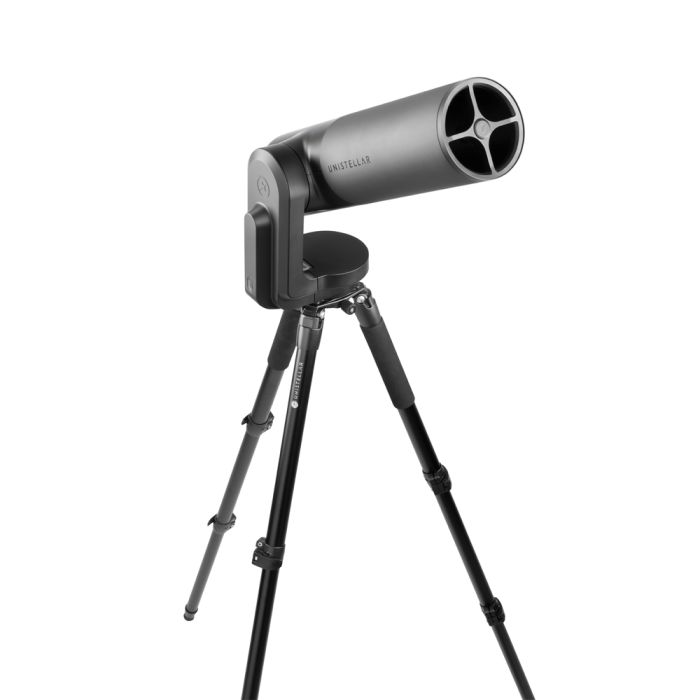
Our best telescope for astrophotography overall is the Unistellar eVscope eQuinox, and for good reason. Even though the telescope is the priciest on our list, if you are serious about astrophotography it is worth the investment. Compared to an average small reflector telescope, the eQuinox knocks it out of the park with clarity for deep-sky objects. The secret is within the algorithms, where resolution can be fixed via firmware updates, and the computer within the telescope will only continue to get better.
The eQuinox does have the same core optics as an average backyard telescope, it really jumps ahead in terms of its sensor, circuitry, and algorithms, all created to give you the best photos of the night sky possible. Where most telescopes may just focus on the planets and the Moon, the eQuinox concentrates on galaxies and other previously unseen objects in the sky, showing you the real depth of the galaxy.
Telescope Specifications
- Aperture: 114mm
- Focal Length: 450mm
- Focal Ratio: f/3.9
- Tube Length: 650cm
Telescopes are like a portal to another world; one that continues to reveal wonders. If you enjoy looking up at the night sky, then try out one of these best telescopes for astrophotography and explore the thousands of stars hidden in our galaxy.
More About:Nerdable Picks
